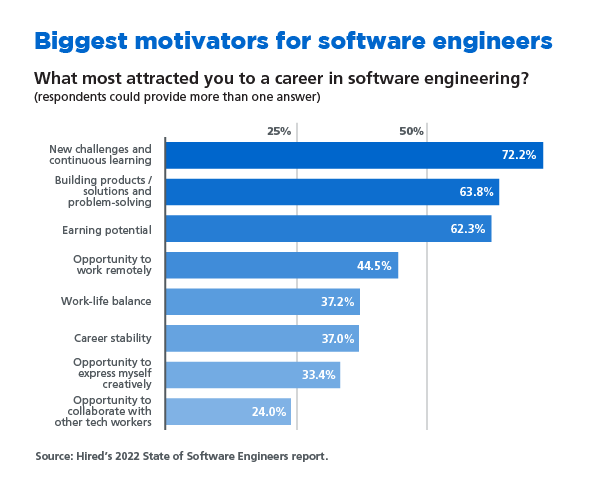Home » Talent crunch: A healthy salary is just the beginning
Talent crunch: A healthy salary is just the beginning

Like a lot of young software developers, Scott King hears from recruiters at least once a day. Some of the emails and LinkedIn messages are specific, others are just alerting him to job openings.
“It seems like every single company is hiring,” says the 26-year-old user-interface developer who works for California-based SugarCRM from his home in Kitchener. “It’s just shocking how many open positions there are.”
Someone in King’s position – a computer science grad with more than five years of experience – can earn well north of CDN$100,000 a year. But like many other tech workers, he says it’s not all about the money.
“It’s really easy to get caught up in the what-will-they-give-me game,” says King. “I was looking for interesting opportunities, like, ‘What would be the hardest piece of software to work on?’ That was kind of what drove me.”
As the global demand for tech talent rages on, tech workers are asking for competitive salaries but they’re also looking for meaningful work, career growth and – increasingly – a flexible environment that includes options for both hybrid and remote work.
Although work-from-home was initially forced on society by the COVID-19 pandemic, many employers and employees have since embraced some version of this worldwide phenomenon.
“We can’t put the genie back in the bottle around flexibility,” says Kristina McDougall, founder and Managing Director of Waterloo-based executive search firm Artemis Canada.

(Communitech graphic: Grace Stallard)
A recent survey by U.S. employment platform Hired asked more than 2,000 software engineers what motivated them. Here are the top five responses:
1. New challenges and continuous learning (72.2 per cent).
2. Building products & solutions, and problem solving (63.8 per cent).
3. Earning potential (62.3 per cent).
4. Opportunity to work remotely (44.5 per cent).
5. Work-life balance (37.2 per cent).
The Hired report also found that the average salary for a software engineer in the Toronto area in 2021 was CDN$125,000, up 9.2 per cent over 2020. That compares to US$156,000 south of the border generally, and US$168,000 in the San Francisco Bay area.
One of the perennial knocks against Canadian tech companies is their penchant for paying less than U.S. companies for similar work. That’s changing. And what’s more, Canadian companies are upping their game when it comes to perks and flexibility.
Retail tech company Tulip “pays very well and, in some cases, above market,” says Marco Osso, Vice President of Employee Success. But the company is also laser-focused on flexibility.
Tulip was one of the first tech companies in Canada to try a form of shortened work week in which employees can use four hours out of their work week as they see fit – “personal time, learning time, or just time to unplug.”
“Our guiding principle is to be as flexible as possible with our employees’ schedule, provided we still meet customer and internal team needs,” says Osso.
Tech companies across Canada are trying similar approaches.
In Saskatoon, Coconut Software recently implemented a four-day work week after a trial period found that employees were more engaged and productive. Staff work eight-hour shifts Monday to Thursday and have Friday “to focus on things that matter to them.” To cover off customer service, CRM staff alternate between taking Monday and Friday off.
“We believe that if we take care of our people, they will, in turn, take great care of our customers and business,” says CEO Katherine Regnier. “Based on the data, performance has remained strong and, in some cases, the team’s productivity has increased.”
In Kitchener, energy tech company EnPowered is offering “workcations” – the freedom to work from a remote location for up to three months.

Prateek Madhikar says workplace flexibility
is a must-have.
(Communitech photo: Anthony Reinhart)
For Prateek Madhikar, workplace flexibility is a must-have. A senior software developer, he has grown to love the work culture at Kitchener email marketing company Hive, which values his contributions, trusts his judgment and allows him to take days off or work remotely on short notice.
In February, for example, a friend in New York invited him to come visit. Madhikar grabbed his laptop and worked remotely from the Big Apple for a week. Previously, the company let him work remotely from India for 11 months while he attended to a family emergency.
“I’m not willing to sacrifice that just to make a few more bucks somewhere else,” he says.
That doesn’t stop recruiters from trying to get Madhikar to switch jobs. Although he’s not looking for a change, he says recruiters reach out to him two to three times a day.
The number of pitches jumped when Madhikar passed his four-year anniversary with Hive – “an eternity” in tech time, says the 27-year-old. The uptick in interest suggests that companies are looking for experienced developers more than recent grads.
“If you’ve been at the same company for four years, it’s just a great sign of you being a good developer because you wouldn’t have lasted that long with the same company otherwise,” he says.
As a senior developer at a 13-person startup, Madhikar is also involved in hiring, so he’s experiencing the talent crunch from both sides. The surge in cross-border recruiting has made it harder to hire developers who want to work in a startup environment but are being offered big salaries by larger companies.
“Before, I was talking to candidates who knew they wanted to work for a startup, who knew what they were getting into compensation-wise,” says Madhikar. “But now there's been a shift. They want to work for a startup but want to be paid as if we’re a big company.”
Still, there are things that any size company can offer to stay competitive.
For example, both Madhikar and King say they value working for companies that provide opportunities to learn new things, build their skillsets and broaden their experience.
When King interviewed for his job at SugarCRM, he asked about opportunities for professional development.
“I asked, ‘How do you work-in career plans? And how do you handle me asking for learning resources and that kind of stuff?’” he says. “And Sugar struck me as having the management experience, the people who knew how to handle younger people who wanted to either transition roles or build skills in an area.”
The job market looks a little different from a student perspective. Despite the demand for developers and programmers, lack of experience is still a challenge for young job seekers.
“Finding a meaningful co-op job can be tough for students who have not yet broken out into the field,” says Rabia Qureshi, who’s approaching her final year of a co-op software engineering program at the University of Guelph. “I feel many recruiters naturally look toward applicants who have previous experience in a development role when considering applications for their open job postings.”
Qureshi has had several great co-op experiences and is optimistic that she will find a good full-time job in her preferred area – front-end development – once she graduates.
“Having a few co-op jobs under your belt helps a lot, as your resume is already filled with some great learning experiences showcasing skills you’ve developed and refined as a student,” she says.
Salary is important to Qureshi, but she will also be looking for an employer who offers remote-work options, opportunities to learn and explore her career interests, a positive work environment and a healthy approach to work-life balance.
“I am optimistic I’ll find a role I like,” she says. “But I also understand that entry-level job offers can take some time to start rolling in.”
Madhikar agrees that the market for tech talent can vary widely depending on experience levels.
“I haven’t seen this many openings ever, but maybe I’m also a little biased because I look at it from an experienced viewpoint now where I’m not applying for a position with no full-time experience,” he says.
A number of reports suggest that the most sought-after tech workers continue to be full-stack and back-end developers, followed by front-end developers. Hot specialties include cybersecurity, search, natural language processing (NLP), mobile, AR and VR, and machine learning, among others.
“It’s no surprise security engineers have been in high demand and now receive the highest average salary with US$165,505 per year,” says Hired. “They have also seen the highest salary growth among all software engineers with +7.6 per cent compared to 2020. There continues to be an immense talent shortage in cybersecurity, driving up demand and salaries even further.”

Kristina McDougall says signing bonuses are still uncommon in Canadian tech.
(Communitech photo: Anthony Reinhart)
Although a lot of candidates are well-informed about competitive compensation, current expectations may be inflated, says Kristina McDougall of Artemis Canada.
“What’s happening is that those stories are getting out to the candidate population, and we are hearing people’s expectations are that if they make a move, there’s going to be a huge increase to their salaries,” she says. “And sometimes (there’s a need for a) bit of a reality check because there might be one data point, someone a couple years out of school made $200,000, but that’s certainly not what’s normal and competitive in the market.”
Many tech companies offer employees some form of equity incentive as a way to retain talent for several years or more. One common vehicle is the restricted stock unit (RSU), which typically vests after four years. The practice is so common with large tech companies, such as Apple, that investment advisers offer specialized advice specifically for employees of Apple and other tech giants.
As for signing bonuses, McDougall says she has seen more lately but they’re still not common in Canadian tech.
“Where it shows up is when someone has either RSUs that pay out or a retention bonus that’s going to pay out, and I want to hire you before you get that payout,” she says. “It’s still the exception to the rule; we’re not seeing companies just saying that signing bonuses are part of the ‘always’ plan.”
With the demand for talent showing no sign of slowing down, the supply-and-demand balance continues to tilt in favour of employees. But with so much choice, tech workers are burdened with the often-stressful task of deciding whether to leap from a well-paying job to an even more lucrative one.
Madhikar tries to keep it simple.
“I like to work at a company that I’m happy at and enjoy working for,” he says.
Third in a four-part series.
Part 1: How Canadian tech founders are running flat-out to fill roles
Part 2: Experts weigh in on how to expand Canada’s tech talent pool
Part 4: 'Boomerang' tech workers on why they came home to Canada
Communitech
https://communitech.ca
"Communitech helps tech-driven companies start, grow and succeed. Communitech was founded in 1997 by a group of entrepreneurs committed to making Waterloo Region a global innovation leader. At the time it was crazy talk, but somehow this community managed to pull it off. Today, Communitech is a public-private innovation hub that supports a community of more than 1400 companies — from startups to scale-ups to large global players. Communitech helps tech companies start, grow and succeed in three distinct ways: - Communitech is a place – the center of gravity for entrepreneurs and innovators. A clubhouse for building cool shit and great companies. - Communitech delivers programs – helping companies at all stages with access to capital, customers and talent. We are here to help them grow and innovate. - Communitech partners in building a world-leading ecosystem – making sure we have all the ingredients (and the brand) to go from a small startup to a global giant."


